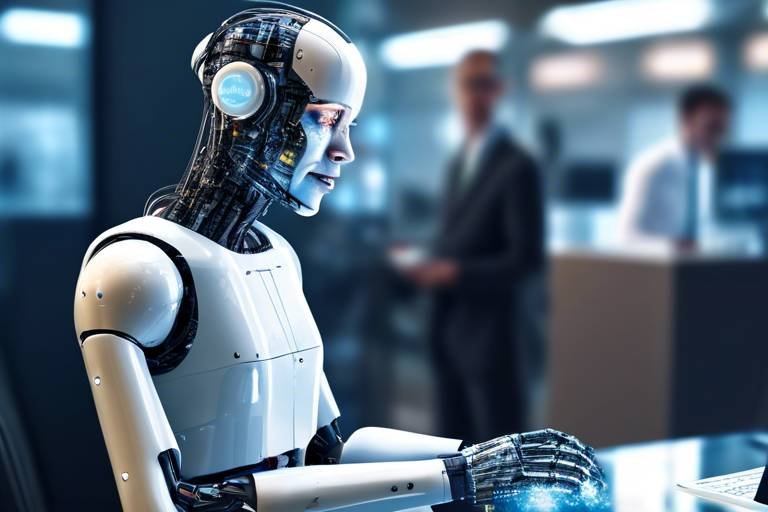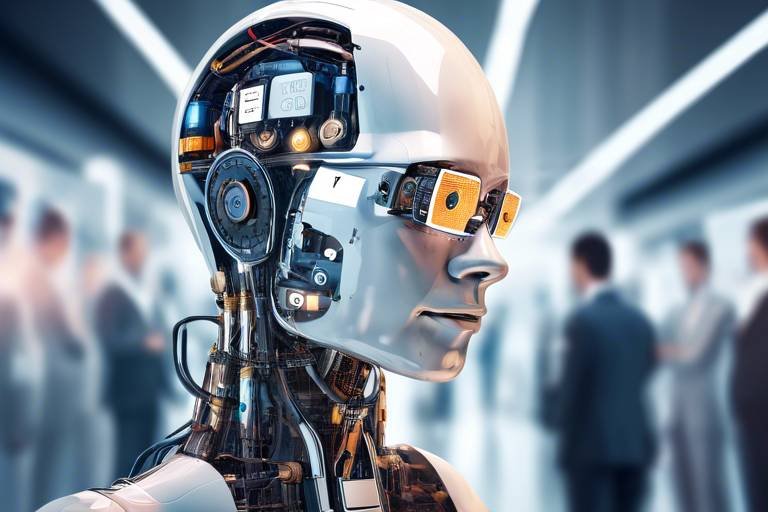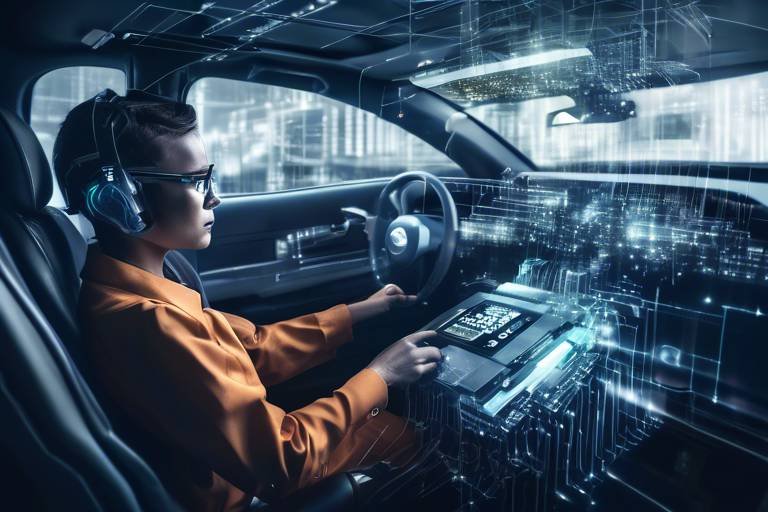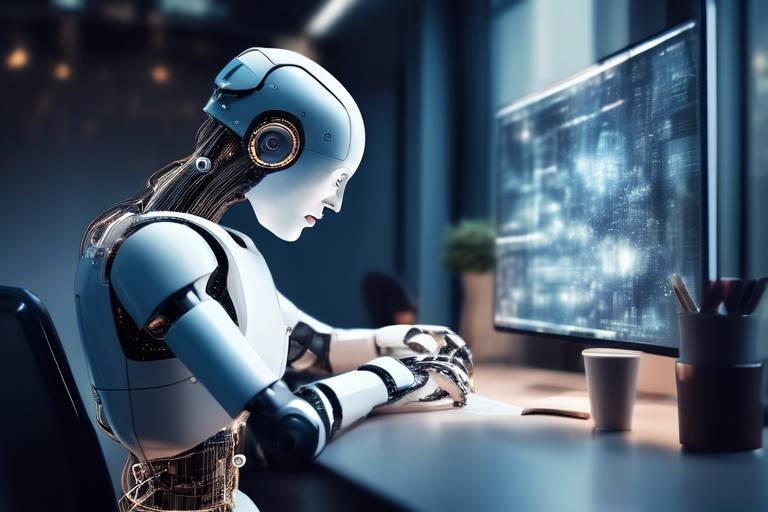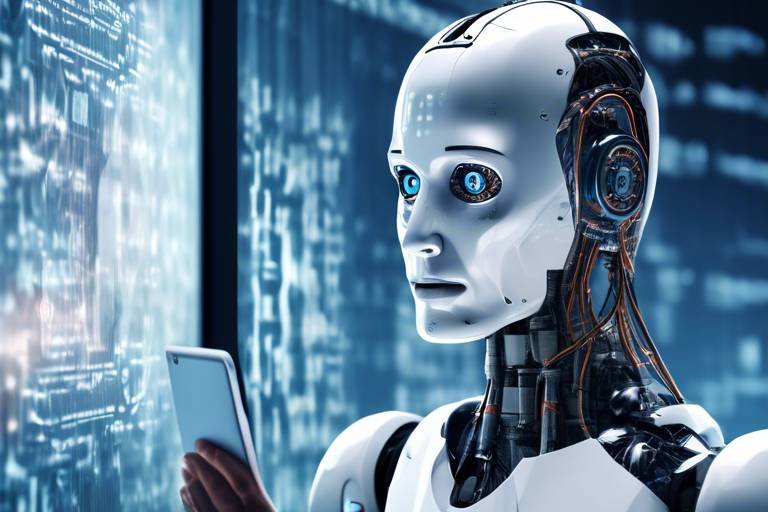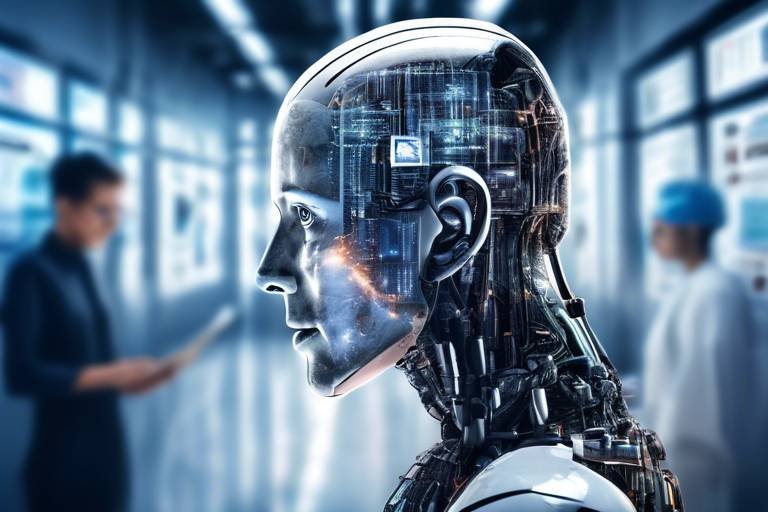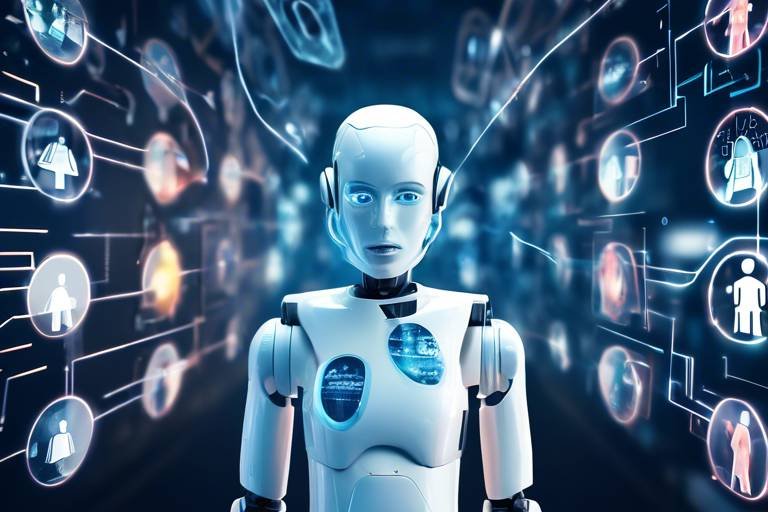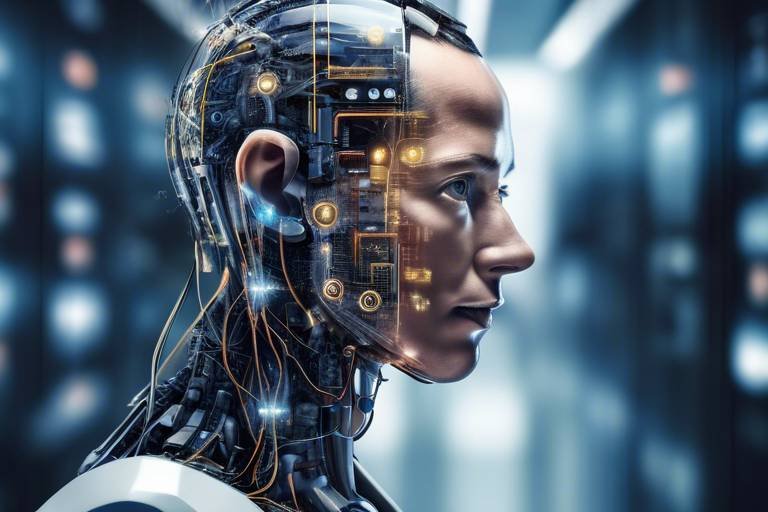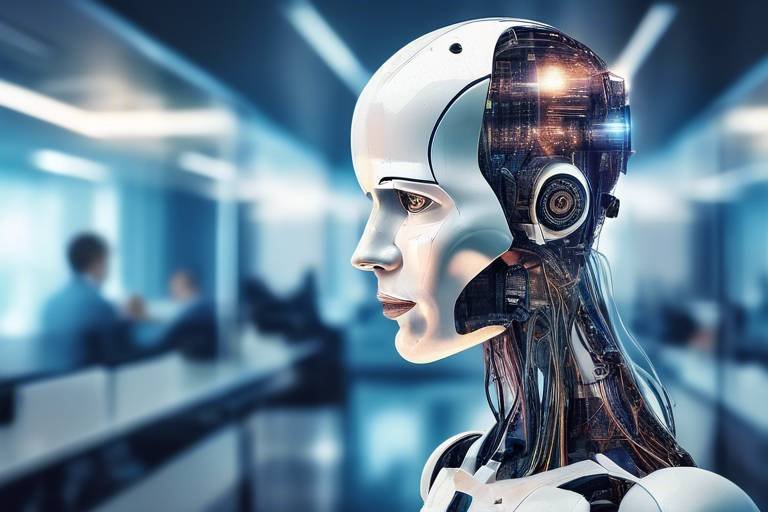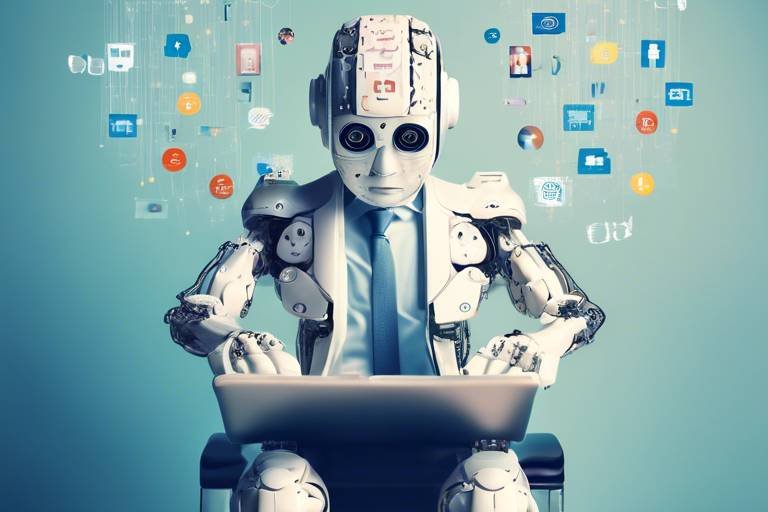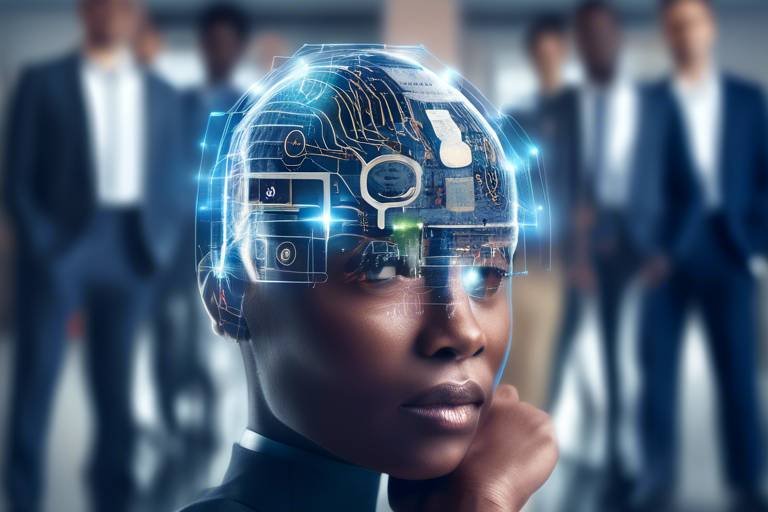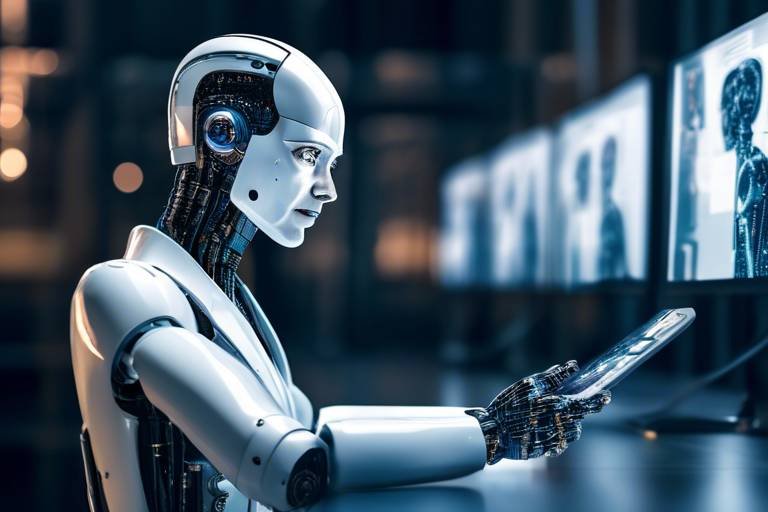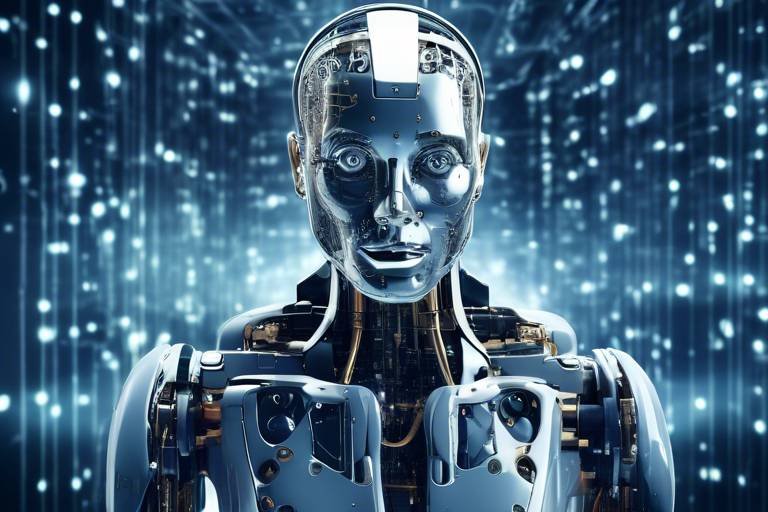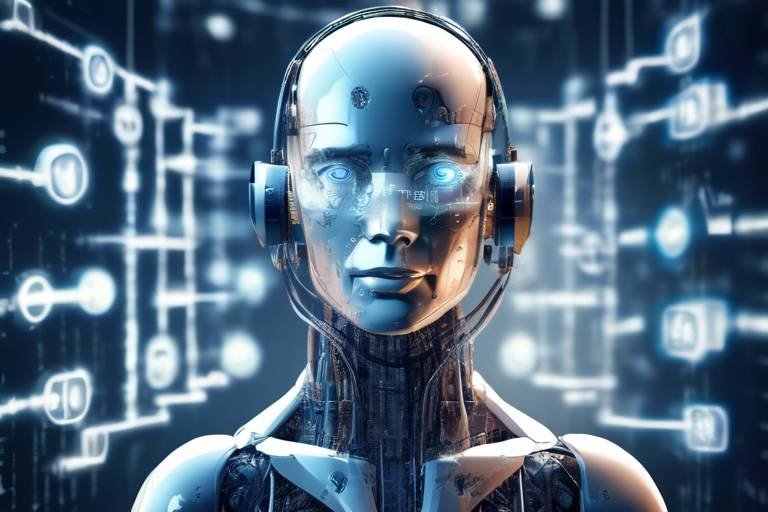How AI will Alter the Nature of Future Jobs
As we stand on the brink of a technological revolution, the question on everyone’s mind is: How will artificial intelligence (AI) reshape the job market? The truth is, AI is not just a buzzword; it’s a game-changer that is fundamentally altering the landscape of employment. Imagine a world where machines not only assist us but also take over tasks we once thought only humans could perform. This transformation is not about replacing humans but rather enhancing our capabilities and redefining our roles in the workplace.
The rise of AI in various sectors is akin to a tidal wave, sweeping away traditional job functions while simultaneously creating a plethora of new opportunities. From healthcare to finance, AI is being integrated into processes that streamline operations and improve efficiency. For instance, in the medical field, AI algorithms can analyze patient data faster than a human doctor, leading to quicker diagnoses and improved patient care. But this doesn’t mean doctors will become obsolete; instead, they will shift their focus towards more complex aspects of patient care that require human empathy and judgment.
As we delve deeper into this topic, it’s essential to recognize that the emergence of AI is not just about technology; it’s about the people behind it. Workers are now required to adapt to these changes by acquiring new skills that blend technical knowledge with soft skills. The demand for roles like data scientists, AI ethicists, and machine learning engineers is skyrocketing, illustrating a shift in workforce needs. Are you ready to embrace this new era? The future job market will require a unique combination of skills that were not as crucial in the past.
In this new landscape, technical skills will take center stage. Programming languages, data analysis, and machine learning are becoming essential tools for job seekers. But let’s not forget about the importance of continuous learning. In a world where technology evolves at lightning speed, staying relevant means committing to lifelong education. Workers must embrace opportunities to upskill and reskill, ensuring they remain competitive in this AI-driven economy.
Moreover, while technical prowess is vital, soft skills are equally crucial. Creativity, problem-solving, and emotional intelligence are the human traits that machines cannot replicate. These skills foster collaboration and innovation, making them indispensable in AI-enhanced workplaces. Think of it this way: while AI can crunch numbers and analyze data, it’s the human touch that brings ideas to life and drives meaningful change. So, how can we strike a balance between these two skill sets?
As we navigate the integration of AI into our work lives, it’s natural to feel concerned about job security. Automation may displace certain roles, leading to anxiety about the future. However, this challenge also presents an opportunity for organizations to reevaluate employee protections and workforce strategies. By investing in training and development, companies can help their employees transition into new roles that AI creates, rather than simply letting them go.
In addition, the COVID-19 pandemic has accelerated the adoption of remote work, and AI tools are playing a significant role in enhancing productivity and collaboration. Imagine a world where your AI assistant manages your calendar, prioritizes your tasks, and even suggests the best time for meetings based on your preferences. This not only makes remote work more viable but also opens doors to a more flexible work environment. Isn’t that something to look forward to?
AI-driven solutions are also paving the way for better work-life balance. By automating routine tasks, employees can focus on higher-value work and their personal well-being. This shift allows for a healthier integration of work and life, where individuals can thrive both professionally and personally. As we look to the future, understanding the dynamics of an AI-enhanced workforce will be essential for organizations aiming to foster resilience and adaptability.
- Will AI really take over my job? - While AI may automate certain tasks, it is more likely to change job roles rather than eliminate them entirely.
- What skills should I focus on developing? - Emphasize both technical skills (like programming and data analysis) and soft skills (such as creativity and emotional intelligence).
- How can I prepare for the future job market? - Embrace lifelong learning and seek opportunities to upskill in areas relevant to AI.
- What are the benefits of AI in the workplace? - AI can enhance productivity, improve decision-making, and allow employees to focus on more meaningful tasks.

The Rise of AI in the Workplace
As we stand on the brink of a technological revolution, the rise of artificial intelligence (AI) in the workplace is nothing short of astonishing. It’s like watching a caterpillar transform into a butterfly, where traditional job roles are being reshaped into something entirely new and exciting. AI is not just a buzzword; it’s a game-changer that is redefining how we work, interact, and even think about our careers.
Imagine walking into an office where your tasks are seamlessly managed by intelligent algorithms. Sounds futuristic, right? But this is the reality many companies are embracing today. From automating mundane tasks to providing insightful data analysis, AI is enhancing productivity and efficiency across various sectors. Industries such as healthcare, finance, and manufacturing are leading the charge, utilizing AI to streamline operations and improve decision-making processes.
However, with these advancements come challenges. As AI takes on more responsibilities, the nature of work is evolving. Employees are finding themselves in a landscape where adaptability is crucial. It’s no longer just about having a degree or years of experience; it’s about being able to pivot and learn new skills quickly. In fact, a recent survey showed that over 70% of workers believe that AI will significantly change their job roles in the next five years. This shift is forcing us to rethink not only our job descriptions but also our career trajectories.
Moreover, the integration of AI into workplaces is creating a demand for new skill sets. Workers are now expected to be proficient in various technical domains, such as data analytics, machine learning, and programming. But it’s not just the technical skills that matter; soft skills are equally important. In a world where machines handle the routine, human creativity and emotional intelligence become invaluable. For instance, the ability to communicate effectively and collaborate with AI systems will be key differentiators in the job market.
To illustrate the impact of AI on job roles, consider the following table:
| Traditional Job Role | AI-Enhanced Role |
|---|---|
| Data Entry Clerk | Data Analyst |
| Customer Service Representative | Customer Experience Manager |
| Manufacturing Worker | Automation Specialist |
This table highlights how AI is not just replacing jobs but also transforming them into roles that require a combination of technical know-how and interpersonal skills. The future workforce will need to embrace this transformation, recognizing that the ability to work alongside AI will be a valuable asset.
In conclusion, the rise of AI in the workplace is a double-edged sword. It brings with it incredible opportunities for innovation and efficiency, but it also demands that workers adapt and evolve. Those who are willing to embrace change and invest in their skill sets will thrive in this new landscape, while those who resist may find themselves left behind. As we navigate this exciting yet uncertain future, one thing is clear: AI is here to stay, and it’s reshaping the way we think about work.
- What industries are most affected by AI? Industries like healthcare, finance, and manufacturing are seeing significant changes due to AI integration.
- Will AI take away jobs? While AI may displace some jobs, it is also creating new roles that require different skills.
- How can workers prepare for an AI-driven future? Embracing continuous learning and developing both technical and soft skills will be essential.

Emerging Job Roles in AI
The landscape of employment is undergoing a seismic shift, and at the heart of this transformation lies artificial intelligence (AI). As AI technology advances, it not only replaces certain tasks traditionally performed by humans but also opens the door to a plethora of new job roles that didn't exist a few years ago. Imagine a world where machines handle mundane tasks, allowing humans to focus on more creative and strategic endeavors. This is not just a fantasy; it is rapidly becoming our reality.
New roles are emerging that require a unique blend of technical expertise and soft skills. For instance, consider the role of an AI Ethicist, who ensures that AI systems are developed and implemented responsibly. This position demands a deep understanding of both technology and ethical considerations, highlighting the need for professionals who can navigate complex moral landscapes. Similarly, AI trainers are becoming indispensable as they help to teach AI systems how to perform specific tasks by providing them with relevant data. This role requires not just technical know-how but also an acute understanding of the nuances of human behavior.
Moreover, we are seeing the rise of Data Curators, professionals tasked with managing and organizing vast amounts of data that AI systems rely on. Their job is crucial because the quality of data directly impacts the effectiveness of AI. Without proper data curation, AI models can become biased or ineffective, leading to disastrous outcomes. In this context, the importance of having skilled individuals who can sift through data, understand its implications, and prepare it for AI consumption cannot be overstated.
As we delve deeper into the world of AI, roles such as AI Business Strategists are also gaining traction. These strategists bridge the gap between technical teams and business leaders, ensuring that AI initiatives align with organizational goals. They need to possess a robust understanding of both AI capabilities and business strategy, making them invaluable in the decision-making process.
To illustrate the diversity of emerging job roles in AI, let's take a look at the following table:
| Job Role | Description | Key Skills Required |
|---|---|---|
| AI Ethicist | Ensures responsible development and implementation of AI systems. | Ethics, AI knowledge, critical thinking |
| AI Trainer | Teaches AI systems how to perform specific tasks by providing relevant data. | Data analysis, communication, domain expertise |
| Data Curator | Manages and organizes data for AI systems. | Data management, analytical skills, attention to detail |
| AI Business Strategist | Aligns AI initiatives with business goals. | Business acumen, technical understanding, strategic thinking |
As we can see, the future job market is not just about replacing old jobs; it's about creating new opportunities that blend technology with human insight. The workers of tomorrow will need to adapt and evolve, embracing both the technical and interpersonal skills that these new roles demand. The question is, are you ready to step into this exciting new world?
In conclusion, the emergence of AI is reshaping job roles in ways we could have only imagined before. The need for professionals who can harness the power of AI while maintaining a human touch is greater than ever. Embracing this change will not only prepare the workforce for the future but also ensure that we can leverage AI to enhance our work and lives.
- What are the most in-demand jobs in AI? Roles such as AI Ethicist, AI Trainer, and Data Curator are among the most sought after as AI technology continues to evolve.
- Do I need a technical background to work in AI? While technical skills are important, many roles also require soft skills, making it possible for individuals from diverse backgrounds to enter the field.
- How can I prepare for a job in AI? Engage in continuous learning, focus on acquiring both technical and soft skills, and stay informed about the latest trends in AI.

Technical Skills for the Future
As we dive into the future of work, it’s impossible to ignore the transformative role of artificial intelligence (AI). The landscape of job skills is shifting dramatically, and technical skills are becoming more critical than ever. Imagine a world where programming languages are as essential as a high school diploma was a generation ago. This isn’t just a prediction; it’s already happening. Job seekers must equip themselves with a toolkit of technical skills to thrive in an AI-driven environment.
One of the most sought-after technical skills is programming. Understanding languages such as Python, Java, or JavaScript can open doors to numerous opportunities in tech. These languages are the backbone of many AI applications, enabling developers to create algorithms that power everything from chatbots to complex machine learning systems. But programming is just the tip of the iceberg.
Another crucial skill is data analysis. In a world where data is often referred to as the new oil, being able to interpret and analyze data effectively is invaluable. Organizations are inundated with vast amounts of information, and those who can sift through the noise to extract meaningful insights will be in high demand. This includes proficiency in tools like SQL, R, or even Excel, which can be a game-changer in decision-making processes.
Additionally, machine learning is an area that is rapidly gaining traction. Understanding the principles of machine learning allows professionals to develop systems that can learn and improve from experience. This skill is not only applicable in tech but also in sectors like healthcare, finance, and marketing, where predictive analytics can lead to better outcomes.
To illustrate the importance of these skills, consider the following table that outlines the top technical skills for the future job market:
| Skill | Description | Industry Demand |
|---|---|---|
| Programming | Languages like Python and Java for software development. | High |
| Data Analysis | Ability to interpret data using tools like SQL and Excel. | Very High |
| Machine Learning | Developing systems that improve through experience. | Growing |
However, it’s not enough to just acquire these technical skills. The key to standing out in the job market is to combine these abilities with soft skills. While technical skills might get your foot in the door, it’s often the soft skills that help you climb the ladder. Think of it this way: a skilled programmer who can’t communicate effectively will struggle in team settings, whereas one who can articulate their ideas and collaborate with others will shine.
In conclusion, as AI continues to shape the future of work, investing in technical skills like programming, data analysis, and machine learning is crucial. It’s a brave new world out there, and those who prepare themselves now will not only survive but thrive in this evolving landscape. So, are you ready to embrace the future?
- What are the most important technical skills for the future? The most important skills include programming, data analysis, and machine learning.
- How can I learn these skills? There are numerous online courses, boot camps, and resources available for self-study.
- Is it necessary to have a degree to work in tech? While a degree can be beneficial, many employers value skills and experience over formal education.
- How do soft skills complement technical skills? Soft skills enhance teamwork, communication, and problem-solving, making you a more well-rounded candidate.

Importance of Continuous Learning
In today's fast-paced world, the cannot be overstated. With the rapid evolution of technology, particularly in the realm of artificial intelligence (AI), workers are faced with the necessity to adapt or risk becoming obsolete. Imagine trying to navigate a bustling city without a map; that’s what it feels like for professionals who ignore the need for ongoing education in their careers. Continuous learning acts as that vital map, guiding individuals through the complexities of an AI-driven landscape.
As AI systems become more sophisticated, they are reshaping job roles and the skills required to perform them effectively. For instance, roles that previously demanded basic technical knowledge are now evolving to require a deeper understanding of AI tools and methodologies. This shift means that workers must not only keep their existing skills sharp but also actively seek out new knowledge. Embracing a mindset of lifelong learning is essential for anyone looking to thrive in this new environment.
Moreover, continuous learning is not just about acquiring new technical skills; it also encompasses the development of soft skills. In a world where machines can handle routine tasks, human qualities like creativity, empathy, and critical thinking become invaluable. These are the traits that AI cannot replicate, and they are crucial for collaboration and innovation in the workplace. Thus, engaging in continuous learning helps individuals enhance both their technical prowess and their interpersonal capabilities, making them more versatile and appealing to employers.
To facilitate continuous learning, organizations can implement various strategies, such as:
- Offering training programs and workshops that focus on both technical and soft skills.
- Encouraging employees to pursue online courses or certifications relevant to their job roles.
- Creating a culture that values knowledge sharing and mentorship among team members.
Ultimately, the commitment to continuous learning is a proactive approach to career development. It empowers workers to take charge of their professional growth and ensures they remain competitive in an ever-changing job market. In this age of AI, where change is the only constant, those who prioritize learning will not only survive but thrive, paving the way for a successful and fulfilling career.
Q: Why is continuous learning important in the age of AI?
A: Continuous learning is crucial because it helps workers adapt to the rapid changes in technology and job requirements. It enables them to acquire new skills and stay competitive in the workforce.
Q: What types of skills should I focus on for continuous learning?
A: Focus on both technical skills, such as programming and data analysis, and soft skills like creativity and emotional intelligence. This combination will prepare you for the evolving job market.
Q: How can organizations promote continuous learning among employees?
A: Organizations can promote continuous learning by offering training programs, encouraging online courses, and fostering a culture of knowledge sharing and mentorship.

Soft Skills in an AI World
As artificial intelligence continues to weave itself into the fabric of our workplaces, the importance of soft skills cannot be overstated. While technical skills like coding and data analysis are vital, it’s the human touch that truly sets individuals apart in an increasingly automated environment. Think of soft skills as the seasoning in a dish; without them, even the best ingredients can fall flat. In this context, soft skills encompass a range of abilities that enhance interpersonal interactions, foster teamwork, and drive innovation.
In an AI-driven world, creativity is more important than ever. Machines can process data and recognize patterns, but they lack the ability to think outside the box. Employees who can generate original ideas, approach problems from unique angles, and devise innovative solutions will be invaluable. For instance, consider a marketing team utilizing AI to analyze consumer behavior. While the AI can provide insights, it takes a creative human mind to craft a compelling campaign that resonates with the audience.
Another critical soft skill is emotional intelligence. This refers to the ability to perceive, evaluate, and respond to emotions—both your own and those of others. In a workplace where AI may handle many tasks, the need for empathy and understanding in team dynamics becomes paramount. Imagine a scenario where an AI tool identifies a decline in employee morale. It’s the emotionally intelligent leader who can recognize the signs, address concerns, and motivate the team toward a positive outcome.
Moreover, problem-solving skills are essential. While AI can assist in analyzing data to identify potential issues, it’s the human worker who must navigate the complexities of real-world problems. For example, if a manufacturing robot malfunctions, a technician must not only diagnose the issue but also devise a solution that takes into account various factors like safety, efficiency, and cost. This blend of analytical thinking and practical application is something AI cannot replicate.
To thrive in an AI-enhanced workplace, individuals should focus on developing the following soft skills:
- Collaboration: Working effectively in teams where AI tools are utilized requires strong communication and cooperation skills.
- Adaptability: The ability to adjust to new technologies and workflows is crucial as AI continues to evolve.
- Critical Thinking: Analyzing information and making informed decisions will set workers apart in a data-driven environment.
In conclusion, while AI may take over certain tasks, it is the human elements—creativity, emotional intelligence, problem-solving, and adaptability—that will define success in the future job market. As we embrace this new era, it’s essential to cultivate these soft skills to complement the technical prowess that AI demands. After all, in a world increasingly dominated by machines, the ability to connect, collaborate, and innovate will be the true differentiators.
Q1: Why are soft skills important in an AI-driven workplace?
A1: Soft skills enhance interpersonal interactions, foster teamwork, and drive innovation, making them essential for collaboration in an AI-enhanced environment.
Q2: What are some examples of soft skills that are valuable in the future job market?
A2: Important soft skills include creativity, emotional intelligence, adaptability, collaboration, and critical thinking.
Q3: How can I improve my soft skills?
A3: Engaging in team projects, seeking feedback, practicing active listening, and taking courses focused on communication and leadership can help enhance your soft skills.

Impact on Job Security
The rise of artificial intelligence (AI) in the workplace is stirring up quite the conversation about job security. Picture this: a world where machines can perform tasks faster, more accurately, and often cheaper than humans. It's a bit like having a super-efficient coworker who never sleeps or takes a coffee break. While this sounds fantastic in theory, it raises some serious questions for the average worker. Will our jobs become obsolete? Are we facing a future where robots take over our roles entirely? These concerns are valid, and they highlight the need for a deeper understanding of how AI is reshaping the employment landscape.
First and foremost, it's essential to acknowledge that while AI can automate certain tasks, it doesn't necessarily mean the end of all jobs. In fact, history has shown us that technological advancements often lead to the creation of new job categories. For example, the advent of computers didn't eliminate the need for administrative roles; instead, it transformed them. Similarly, AI is likely to change job descriptions rather than wipe them out completely. However, this transition can be daunting, especially for those in roles that are more susceptible to automation.
To navigate this shift, workers must be proactive about their career development. This means not only honing existing skills but also acquiring new ones that align with the evolving demands of the job market. A recent study highlighted the types of jobs most at risk of automation, which include:
- Routine physical tasks, such as assembly line work
- Data entry and processing jobs
- Customer service roles that rely on scripted responses
On the flip side, roles that require creativity, emotional intelligence, and complex problem-solving are less likely to be replaced by AI. Think about it: can a machine truly understand human emotions or come up with innovative solutions in a brainstorming session? Probably not. This is where the human touch becomes invaluable.
Moreover, the integration of AI into various sectors brings about a need for a reevaluation of employee protections and workforce strategies. As companies adopt AI-driven solutions, they must also consider the ethical implications of their decisions. Are they providing adequate training for employees to adapt to new technologies? Are they ensuring that workers displaced by automation have access to re-skilling programs? These questions are crucial for maintaining a balanced and fair job market.
In conclusion, while the impact of AI on job security can seem overwhelming, it also presents opportunities for growth and transformation. By embracing continuous learning and adapting to new roles, workers can position themselves to thrive in an AI-enhanced world. It's not about competing with machines; it's about leveraging their capabilities to enhance our own potential. The future may be uncertain, but with the right mindset and skills, we can navigate the challenges ahead.
- Will AI really take away all jobs? - Not all jobs will be eliminated. AI will change job roles and create new opportunities.
- What skills should I focus on to remain employable? - Focus on technical skills like programming and data analysis, along with soft skills such as creativity and emotional intelligence.
- How can I prepare for the changes brought by AI? - Embrace lifelong learning and seek training programs that help you adapt to new technologies.
- Are there any industries that will be more affected by AI? - Industries with routine tasks, such as manufacturing and data entry, are more likely to see job displacement.

AI and Remote Work Trends
In recent years, the landscape of work has undergone a seismic shift, largely fueled by the rapid advancement of artificial intelligence (AI). The COVID-19 pandemic acted as a catalyst, accelerating the adoption of remote work across various industries. With more companies embracing flexible work arrangements, AI tools have emerged as essential allies in enhancing productivity and collaboration. Imagine having a virtual assistant that not only schedules your meetings but also analyzes your workload to suggest the best times for deep work. This is not science fiction; it's the reality of how AI is reshaping our work environments.
As organizations adapt to this new normal, AI-driven platforms are streamlining communication and project management. Tools like Slack and Trello are integrating AI features that help teams stay connected and organized, regardless of their physical location. For instance, AI can prioritize tasks based on deadlines and project importance, allowing employees to focus on what truly matters. This level of efficiency is not just a luxury; it's becoming a necessity in a world where time is money.
Moreover, AI is playing a pivotal role in fostering a more inclusive workplace. By utilizing AI algorithms, companies can analyze hiring practices and employee feedback to ensure diversity and equity in their remote teams. This data-driven approach helps organizations identify biases and implement strategies that promote a culture of inclusivity. In essence, AI is not only transforming how we work but also how we think about work culture.
However, the rise of AI in remote work also brings challenges that need to be addressed. One major concern is the potential for job displacement. As automation takes over routine tasks, the fear of job loss looms large for many employees. To combat this, companies must invest in upskilling and reskilling their workforce. This means providing access to training programs that equip employees with the necessary skills to thrive in an AI-enhanced environment.
To illustrate the impact of AI on remote work, consider the following table that highlights key trends:
| Trend | Description | Impact |
|---|---|---|
| Increased Flexibility | AI tools enable employees to work from anywhere, anytime. | Improved work-life balance and job satisfaction. |
| Enhanced Collaboration | AI facilitates seamless communication among remote teams. | Boosted productivity and team cohesion. |
| Data-Driven Decision Making | AI analyzes data to inform strategic business decisions. | Greater efficiency and effectiveness in operations. |
As we look to the future, it's clear that AI will continue to shape the dynamics of remote work. Organizations that embrace this technology will not only enhance their operational efficiency but also create a more engaged and satisfied workforce. The key lies in balancing the benefits of AI with the human touch that is essential for innovation and creativity.
- How is AI changing remote work?
AI is streamlining communication, enhancing productivity, and enabling better work-life balance by automating routine tasks. - Will AI replace jobs in remote work?
While AI may displace certain roles, it also creates new opportunities that require a combination of technical and soft skills. - What skills should I develop for the future of remote work?
Focus on both technical skills like data analysis and programming, as well as soft skills like creativity and emotional intelligence.

Balancing Work-Life Integration
In today's fast-paced world, achieving a harmonious balance between work and personal life has become more critical than ever. The rise of artificial intelligence (AI) in the workplace is reshaping this balance, offering innovative solutions that can enhance productivity while also promoting well-being. Imagine a scenario where your mundane tasks are automated, allowing you to focus on what truly matters—your creativity, your relationships, and your personal growth. Sounds appealing, right?
AI-driven technologies are stepping in to take over repetitive and time-consuming tasks, freeing up valuable time for employees. For instance, consider AI tools that handle scheduling, data entry, and even customer inquiries. By offloading these responsibilities, workers can redirect their energy toward more strategic and fulfilling aspects of their jobs. This shift not only boosts productivity but also contributes to a healthier work-life integration.
Moreover, the flexibility that AI brings to remote work is a game-changer. With the ability to collaborate seamlessly through virtual platforms, team members can work from anywhere, anytime. This flexibility allows individuals to tailor their work hours around personal commitments, be it family responsibilities, hobbies, or self-care routines. The result? A more engaged and satisfied workforce. However, it’s essential to recognize that this balance requires conscious effort. Without the boundaries that a traditional office environment provides, it’s easy for work to seep into personal time.
To navigate this new landscape effectively, employees should consider implementing strategies that promote a healthy work-life integration. Here are some tips:
- Set Clear Boundaries: Define specific work hours and stick to them. This helps to create a distinction between professional and personal time.
- Leverage AI Tools: Use AI applications that automate routine tasks, allowing you to focus on strategic projects and personal interests.
- Prioritize Self-Care: Make time for activities that rejuvenate you, whether it's exercising, reading, or spending time with loved ones.
As we look ahead, organizations must also play a pivotal role in fostering a culture that values work-life integration. By promoting policies that support flexible working arrangements and encouraging employees to take time off, companies can create an environment where individuals feel empowered to thrive both professionally and personally. After all, a happy employee is a productive employee!
In conclusion, the integration of AI into the workplace presents a unique opportunity for individuals to redefine their work-life balance. By embracing these technological advancements and adopting mindful practices, we can enjoy the best of both worlds—achieving professional success while nurturing our personal lives.
Q1: How can AI improve my work-life balance?
A1: AI can automate routine tasks, allowing you to focus on more meaningful work and personal activities, thus enhancing your overall work-life balance.
Q2: What are some AI tools I can use for better productivity?
A2: Tools like scheduling assistants, project management software, and chatbots can help streamline your workflow and reduce time spent on repetitive tasks.
Q3: How can I ensure I don't overwork while working remotely?
A3: Set clear work hours, establish a dedicated workspace, and take regular breaks to maintain a healthy boundary between work and personal life.

Future Workforce Dynamics
As we stand on the brink of a new era shaped by artificial intelligence, understanding the is crucial for both employees and employers. The integration of AI is not just a trend; it's a fundamental shift that will redefine how we work, interact, and collaborate in the workplace. Imagine a world where your co-worker is not just another person, but a sophisticated AI system designed to enhance your productivity and creativity. This is not science fiction; it's the reality we are heading towards, and it demands our attention.
One of the most significant changes we can expect is the blurring of roles. Traditional job descriptions are likely to become more fluid as AI takes over repetitive tasks, allowing humans to focus on more complex and creative responsibilities. For instance, a marketing professional might find themselves collaborating with AI tools that analyze market trends and consumer behavior, enabling them to develop more targeted and effective campaigns. This shift not only enhances efficiency but also fosters a more collaborative environment where human intuition and AI analytics work hand in hand.
Furthermore, the rise of AI will necessitate a shift in how we view team dynamics. In the future, teams may consist of a diverse mix of human talent and AI capabilities, leading to the emergence of hybrid teams. These teams will require new forms of communication and collaboration, where understanding how to work alongside AI becomes as essential as traditional teamwork skills. The ability to interpret AI-generated data and make decisions based on that information will be a key competency in this new landscape.
Another crucial aspect of future workforce dynamics is the emphasis on adaptability. As technology continues to evolve at an unprecedented pace, employees will need to be agile and open to change. This means not only acquiring new skills but also being willing to unlearn outdated practices. Organizations will need to foster a culture of continuous improvement, encouraging employees to embrace change and view challenges as opportunities for growth. In this context, training programs will have to be more dynamic, focusing on real-time skill development that aligns with the latest technological advancements.
Moreover, diversity and inclusion will play a pivotal role in shaping future workforce dynamics. As AI systems are deployed, there is a risk of bias if not managed correctly. Companies will need to ensure that their AI tools are designed and trained with diverse datasets to avoid perpetuating existing inequalities. This focus on diversity will not only enhance the creativity and innovation within teams but also ensure that AI serves all segments of society fairly.
In summary, the future workforce dynamics will be characterized by a blend of human and AI collaboration, adaptability to rapid changes, and a strong commitment to diversity and inclusion. As we navigate through these changes, it's essential for both employees and organizations to remain proactive and engaged, ready to harness the potential of AI to create a more efficient and inclusive workplace.
- How will AI change job roles in the future?
AI will automate routine tasks, allowing employees to focus on more complex and creative responsibilities, leading to the emergence of new job roles that blend technical and soft skills. - What skills will be most important in an AI-driven workplace?
Technical skills like programming and data analysis, along with soft skills such as creativity, problem-solving, and emotional intelligence, will be crucial for success. - How can employees prepare for the future workforce dynamics?
Employees should embrace lifelong learning and adaptability, continuously updating their skills and being open to new ways of working alongside AI. - What is the role of diversity in AI?
Diversity is essential to ensure that AI systems are fair and unbiased, and to foster creativity and innovation within teams.
Frequently Asked Questions
- How is AI changing the job market?
AI is revolutionizing the job market by automating routine tasks, which can lead to the displacement of some jobs. However, it also creates new opportunities and roles that require a combination of technical and soft skills, ultimately reshaping the employment landscape.
- What new job roles are emerging due to AI?
As AI technology evolves, new job roles are emerging, such as AI specialists, data scientists, and machine learning engineers. These roles often require a mix of technical expertise and interpersonal skills, paving the way for a workforce that can effectively collaborate with AI systems.
- What technical skills should I focus on for future jobs?
To stay relevant in an AI-driven job market, focus on developing technical skills such as programming, data analysis, and machine learning. These skills are increasingly in demand as companies seek individuals who can harness the power of AI technology.
- Why is continuous learning important in the age of AI?
Continuous learning is essential because the pace of technological change is rapid. By embracing lifelong learning, workers can adapt to new tools and processes, ensuring they remain competitive and capable of thriving in an evolving workplace.
- What soft skills are important in an AI-enhanced workplace?
In addition to technical skills, soft skills like creativity, problem-solving, and emotional intelligence are crucial. These skills facilitate collaboration and innovation, allowing employees to work effectively alongside AI technologies.
- Will AI affect job security?
Yes, the integration of AI can raise concerns about job security, as automation may replace certain roles. This necessitates a reevaluation of employee protections and strategies to ensure a stable workforce in the face of technological advancements.
- How has AI influenced remote work trends?
AI has significantly enhanced remote work by providing tools that improve productivity and collaboration. This makes remote jobs more viable and efficient, allowing organizations to adapt to the changing work environment.
- Can AI help achieve a better work-life balance?
Absolutely! AI-driven solutions can automate routine tasks, freeing up employees to focus on higher-value work and personal well-being. This shift can lead to a healthier work-life integration for many individuals.
- What should organizations consider regarding future workforce dynamics?
Organizations need to understand the implications of AI on workforce dynamics. Fostering a resilient and adaptable workforce is essential as AI continues to evolve, ensuring that employees are equipped to thrive in the new landscape.

